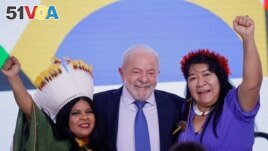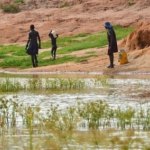29 January 2023
Brazil's New President Luiz Inacio Lula da Silva is putting environmental activists in top government positions.
For example, Joenia Wapichana is becoming the first indigenous woman to lead the country's Indigenous Affairs office. She will start the job in February when Lula swears her in.
Lula won the last election over former President Jair Bolsonaro.

Sonia Guajajara, Brazil's President Luiz Inacio Lula da Silva and Indigenous Congresswoman Joenia Wapichana react during Guajajara's inauguration ceremony at the Planalto Palace in Brasilia, Brazil January, 11, 2023. REUTERS/Adriano Machado
But Wapichana is already getting started. On a recent day, the Associated Press reported that she walked through all the agency's rooms shaking a traditional rattle, or noisemaker.
She was asking for help from her ancestors in a cleansing ceremony. As she walked through the offices, indigenous people working there followed her, saying: "Yoohoo, Funai is ours." Funai is the name of the agency, the National Indigenous People Foundation.
Critics said the agency's past leaders did not do enough to protect the Amazon rain forest.
In 2022, a satellite image study showed that deforestation – the term for removing trees – increased during Bolsonaro's presidency. Some environmental groups say deforestation was taking place at a slower rate in Brazil before he took office.
Lula is putting people like Wapichana into jobs where they can help grow protected areas for indigenous people and limit deforestation.
George Porto Ferreira is a researcher for Ibama, Brazil's environmental law-enforcement agency. He said Lula added employees who can "reverse all the environmental destruction" during the Bolsonaro government.
Some are concerned, however, that Lula will not be able to do everything he wants. Lula did not do such a good job during his past presidential terms. In addition, some Bolsonaro supporters still govern large Amazon states, and they will not easily change their policies. Bolsonaro's supporters think Lula's ideas will hurt the economy by restricting land development.
One of Lula's biggest moves so far was appointing Marina Silva to lead Brazil's environmental ministry. Silva is a former rubber collector, or tapper, from Acre state. She led the ministry from 2003 to 2008 during Lula's former presidency. She resigned after a conflict with government and farm leaders who did not like her development restrictions.
Lula has made other moves to support the Amazon's native people and the environment. The changes include restarting the Amazon Fund, ending a Bolsonaro action that permitted mining in indigenous and protected areas and creating an indigenous peoples' ministry.
Sonia Guajajara will lead the Ministry of Indigenous Peoples. She is the first indigenous woman to hold such an important job in the government.
She said: "It won't be easy to overcome 504 years in only four years. But we are willing to use this moment to promote a take-back of Brazil's spiritual force."
One of Lula's goals is to end deforestation by 2030. However, the new government's goals will not be easy to reach. Bolsonaro supporters govern six of the nine Amazon states.
One problem is illegal gold mining in the Amazon. It will be hard to end because it produces a lot of money and work. Mining employs thousands of people in Brazil, Peru and Venezuela. The mining has poisoned water with mercury. The unsafe water hurts people who drink it and catch fish in the rivers close to the mines.
Gustavo Geiser is a crime investigator who has worked with the Brazilian Federal Police for 15 years. He said a main reason for the problems is "the state's absence."
Supporters say the president can expand indigenous territories. Lula is being asked to create 13 new territories, a process that slowed under Bolsonaro, who said he would not give any more land to indigenous people.
The first step may be to expand the area of Uneiuxi, an area that is home to 23 indigenous groups. A signature by Lula will increase the area by 37 percent, finishing a process that started nearly 40 years ago.
I'm Dan Friedell.
Dan Friedell adapted this story for VOA Learning English based on a report by the Associated Press.
__
Words in This Story
indigenous –adj. used to describe a native person
reverse –v. to change to an opposite state or condition
promote –v. to support action aiming to bring about a certain result
absence –n. a state in which something is expected but missing
signature –n. a person's written name on a document













